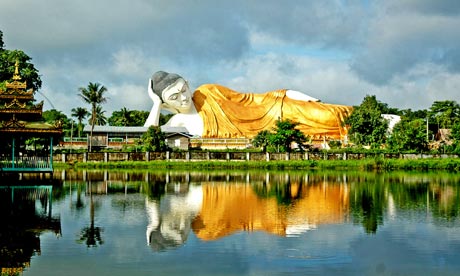The Guardian, Monday 15 February 2010
Article history
Ruled by the world's last military junta, Burma is shunned by both governments and tourists. Yet its people are crying out for contact. So what's the ethical traveller to do?

One of Burma's hidden treasures: a giant statue of a reclining Buddha. Photograph: Pierre-Elie de Pibrac/Getty Images/Flickr RM
On the boat to Mandalay the same thoughts kept turning in my mind. The red orb of a full moon appeared, casting streaks of gold across the placid water of the Irrawaddy river, but even this beauty failed to displace the questions that haunted our two-week stay earlier this month. Why were we in Burma? Was our trip giving comfort to the country's military dictatorship, by common consent one of the world's worst regimes?
Burma never has been a popular destination, and after the bloody suppression of the monks' protests in September 2007 and the government's delay in helping hundreds of thousands who lost everything in Cyclone Nargis the following May, the tourist trickle almost dried up. Only 47,161 people came from Europe last year, mainly from France and Germany, making Burma the country least visited by British people anywhere in Asia (with the exception of North Korea).
So was our party of visitors wrong to buck the trend? Not if you go by the number of people who eagerly approached us to practise their English and, after a tentative start, wanted to say what they thought of their rulers. "They're mad," one driver told us as he steered his creaking banger past a crush of Chinese bicycles and motorbikes, the commonest form of transport on Burma's rutted roads.
In decades of reporting I have generally stuck to journalism's rule number one: don't quote taxi drivers. But in a few places (Manhattan, Havana, and now Burma) you meet such a variety of characters forced to earn a living behind the wheel that their opinions offer a broad range of views. This driver had trained as a computer engineer before serving in a Burmese embassy in a western country. "Life is not improving here," he said. "Most people don't like the government. We have no legislative body. We have no democracy." (Apologies for breaking journalism's rule number two: don't use anonymous quotes if they are pejorative. In Burma, critical sources deserve protection.)
Another driver was making political comments within five minutes of our hiring him from Rangoon airport into town. Asked if it was our first trip to Burma, I said yes, and then added, "I see you call it Burma." "Burma good name, Myanmar new name," he replied mischievously. When we inquired what the attractive gardens were behind locked gates on the left, "That was the university. Now closed," he commented. "Because of the demonstrations, when we had demonstrations. They moved all the universities out of Rangoon. Now it's quiet," he added, before smiling sarcastically: "Good idea."





No comments:
Post a Comment